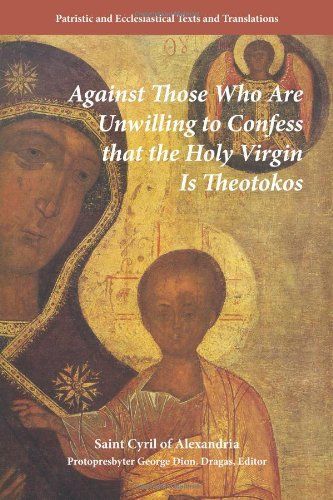
Against Those Who Are Unwilling to Confess that the Holy Virgin Is Theotokos
The term Theotokos helped to establish the truth that Jesus Christ, who was born of the Virgin Mary, was the preexisting Son of God who also became man without ceasing to be God in order to recapitulate in Himself the entire humanity and work out an eternal salvation for it. The point here is that Jesus Christ is the same Son of God who as true God "was born" ineffably and eternally from the Father and as true man was born in time and according to the flesh from the Virgin for the completion of the ages. Jesus Christ is one person who unites in Himself two natures, the divine and the human, and thus deifies the human by leading it to participate in the perfections of the divine. The term Theotokos brings out all these aspects of the mystery of the Incarnation and stresses its soteriological import. St. Cyril was not the first to use this dogmatic term Theotokos in a Christological dogmatic sense. Several theologians before him, including St. Athanasius and the Cappadocians, as well as conciliar Church documents, had used it in their writings. St. Cyril defended its propriety and explained its dogmatic significance for the Church's doctrine of Christ, because Patriarch Nestorius of Constantinople denounced it as unacceptable. In the debate that ensued, it became obvious that Nestorius entertained a false doctrine of Christ, which eventually led to his condemnation. It was he who became an innovator and deviator from the Church's Tradition and not St. Cyril as some contemporary scholars have asserted. The present text can be described as a model of Patristic theological discourse. It is an anti-heretical treatise, which refers to a central dogma of Christian theology, the doctrine of Christ. Its importance lies, first, in that it demonstrates that dogma and exegesis are intertwined in Patristic theological thought and discourse; and second, that it shows that Patristic dogma is rooted in the biblical witness, and that the Fathers handled the Scriptures in a different way than the ancient heretics and many of our contemporary biblical scholars.